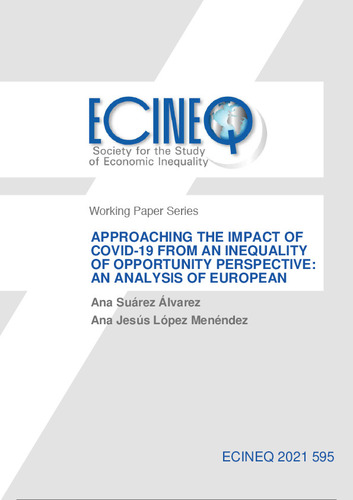Approaching the impact of COVID-19 from an Inequality of Opportunity perspective: An analysis of the European Countries
Autor(es) y otros:
Palabra(s) clave:
Impact Covid-19
Fecha de publicación:
Editorial:
ECINEQ
Citación:
Resumen:
The COVID-19 pandemic opens up a wide range of interesting issues related, on the one hand, to the causes that have facilitated its expansion and, on the other, to the measures that can mitigate its effects.The aim of this work is to perform an analysis of the impact of the COVID-19 disease from an Inequality of Opportunity approach, trying to distinguish the impact due to circumstances and efforts. With this aim we pose different questions: How much of the effect of COVID-19 disease is determined by unalterable circumstances of the region where one lives? How much of these effects depends on countries’ performance? And more specifically, which factors or circumstances are the ones with higher impact in the incidence of COVID-19 disease? The answers to these questions can be of great help in order to understand to which extent the effects of the Covid-19 disease could be mitigated through suitable measures. The variables we include in our analyses are able to explain more than half of the variability in the fatality rate. We found that tourism arrivals are of great importance to explain the fatality rate of the COVID-19. Likewise, we found that the initial socio-economic circumstances, the health endowments and the political response to contain the pandemic lost relevance as the disease spreads. Finally, our findings suggest that containment policies have had little effect in decreasing the fatality rate.
The COVID-19 pandemic opens up a wide range of interesting issues related, on the one hand, to the causes that have facilitated its expansion and, on the other, to the measures that can mitigate its effects.The aim of this work is to perform an analysis of the impact of the COVID-19 disease from an Inequality of Opportunity approach, trying to distinguish the impact due to circumstances and efforts. With this aim we pose different questions: How much of the effect of COVID-19 disease is determined by unalterable circumstances of the region where one lives? How much of these effects depends on countries’ performance? And more specifically, which factors or circumstances are the ones with higher impact in the incidence of COVID-19 disease? The answers to these questions can be of great help in order to understand to which extent the effects of the Covid-19 disease could be mitigated through suitable measures. The variables we include in our analyses are able to explain more than half of the variability in the fatality rate. We found that tourism arrivals are of great importance to explain the fatality rate of the COVID-19. Likewise, we found that the initial socio-economic circumstances, the health endowments and the political response to contain the pandemic lost relevance as the disease spreads. Finally, our findings suggest that containment policies have had little effect in decreasing the fatality rate.
Colecciones
- Artículos [37548]
- Economía Aplicada [221]
Ficheros en el ítem




